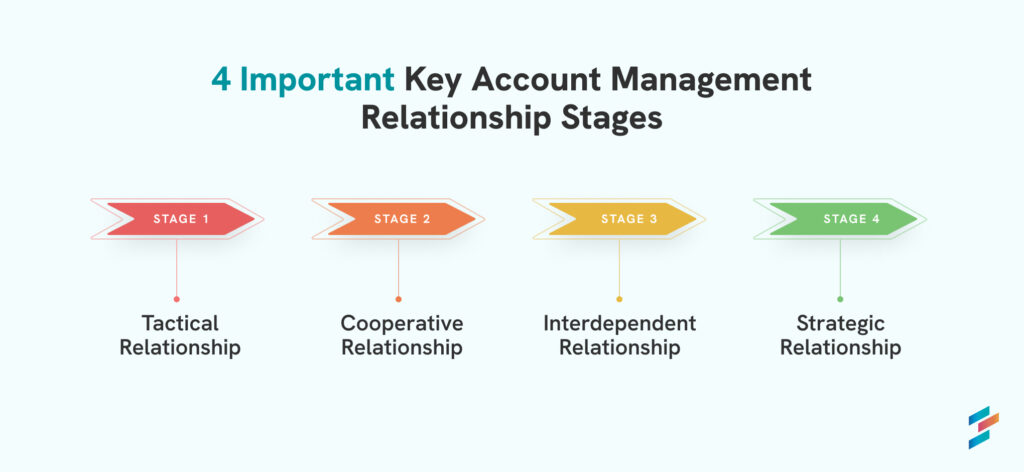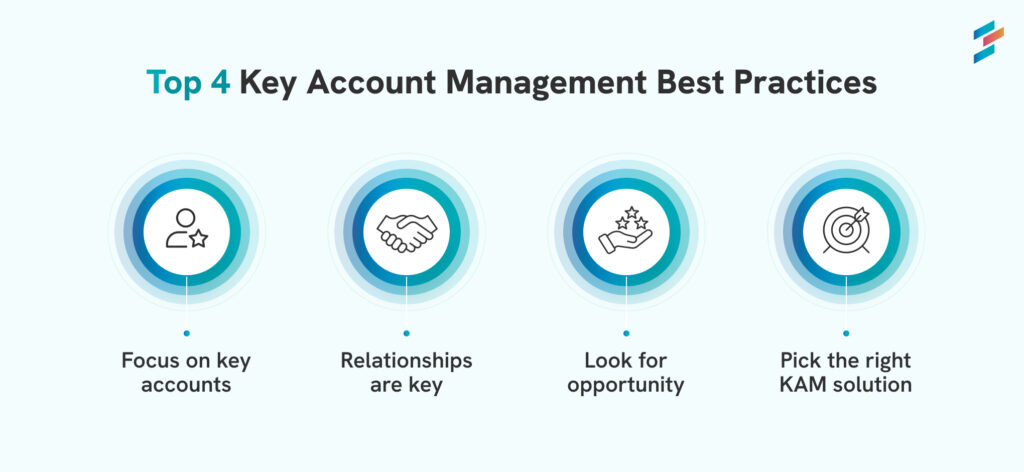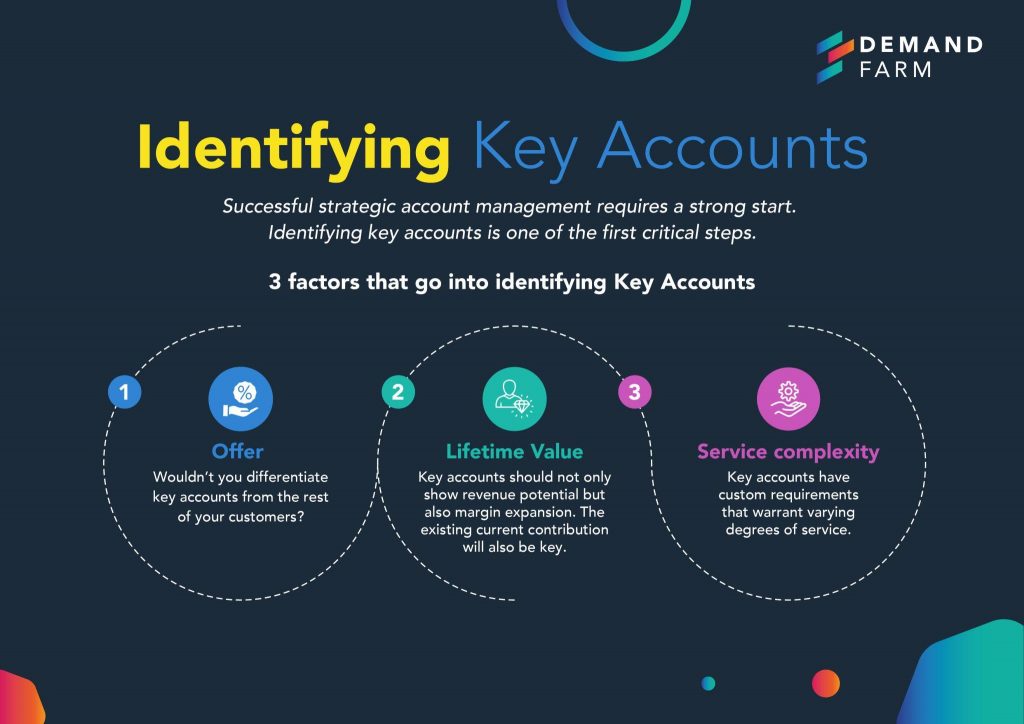A Complete Key Account Management (KAM) Guide for 2024
Table of Contents
Milind Katti
COO & Co-Founder, DemandFarm
A Complete Guide to Key Account Management (KAM)
Learn the A to Z of Key Account Management or KAM in this Complete Guide to Key Account Management created by DemandFarm. Use the table of contents on your left to easily navigate through the topics covered within the article.
What is Key Account Management?
Key account management (KAM) is the process of managing and growing a company’s most important B2B customers and large accounts in a systematic way to maximize value for both organizations. This involves strategic efforts to deeply understand client needs, forge long-term loyalty beyond transactions, and strengthen relationships over time.
Key Account Management is all about unlocking the potential of your best 20% of customers, driving 80% of your revenue.
So, what does KAM do?
- It sets up a clear program to look into, plan for, and manage these key accounts strategically.
- It helps put together strategies that work by getting everyone involved, both internal and external stakeholders.
- It’s great for strengthening your relationships with the most important people, helping you find more opportunities to upsell and cross-sell.
- It helps you boost win rates for expansion opportunities in your key accounts and make better revenue predictions.
In practice, it’s smart for companies to have different plans for managing their key accounts based on how much money they bring in. So, you’d prioritize your top 20-30% of key accounts over your mid-tier ones, 50-60%, and your bottom 10-30%.
An exciting new trend is identifying “greenfield” key accounts even before they become customers. By mapping their acquisition journey and growth potential, you can align your sales and marketing to a “land and expand” approach. This focuses on getting a foot in the door with a small deal at first, and then growing the account over time.
In the past three years, “land and expand” has emerged as the go-to model for making the most of your key relationships over the long term.
Why Key Account Management?
“How many accounts should one account manager handle?” Well, without a solid Key Account Management (KAM) strategy, we usually see managers juggle anywhere from 20-50 accounts and valuable clients.
And here’s the catch—with a packed roster like that, managers spend all their time reacting to opportunities at play. They rarely get to step back, build deeper relationships, or craft more strategic plans that boost growth within these accounts.
Now, key accounts tend to be huge complex organizations—think multiple subsidiaries, offices, and buyer groups. It takes a special approach to handle ecosystems like those. In some cases, we’ve even seen companies assign multiple account teams just for mega-giants like Amazon. You might have a Global Key Account Manager, then Regional Managers drilling into specific areas.
When account volumes are crazy high, setting goals across different internal teams also gets tough. How can you team up to better serve key accounts when everyone’s underwater already?
When Key Account Managers have just ~5 accounts max, that finally allows them to get hyper-focused. They can build trust, spot new opportunities, and grow the account sustainably.
The other piece is leadership oversight into key account portfolio metrics. You have to implement rock-solid governance processes to know what’s working and what’s not. Sales ops and sales enablement teams depend on those insights to properly support key account management strategies.
So in plain terms, by designation your best players on just a few key accounts, you make big gains possible. But it only works if there’s discipline around goal-setting and performance tracking too.
What is the difference between Key Account Management and Sales?
Sales is all about winning new opportunities. Sales teams follow various sales methodologies like MEDDIC, SPIN, and Challenger Sales, or processes to win large enterprise deals that span across multiple quarters/years. Organizations need a strong Opportunity Management framework to track gaps in their opportunity life cycle and enable their sales teams to sell better.
On the other hand, successful key account management is not just about winning opportunities but also about looking at the big picture for large complex accounts. Key Account Management involves creating growth/expansion strategies that should result in the following:
- Identifying whitespaces/opportunities
- Improving relationships with key stakeholders
- Retain and create consistent revenue growth across your key accounts
Each organization strives to position itself as a strategic partner rather than a vendor to its enterprise customers. Key Account Management guides Account Managers to think strategically at every step and brings them closer to achieving this goal!
In Sales you ‘sell’. In Key Account Management you help customers ‘buy’.
4 Important Key Account Management Stages of Relationship (with Key Accounts)
Key account management is concerned with managing relationships with your valuable customers. It is important to understand these relationships, which vary from simple, transactional forms to intimate and complex liaisons. Your key account manager and your organization should know which stage of key account relationship you have with each customer and manage them accordingly.

1. Tactical Relationship
Think of this stage as the early days of getting to know someone. It’s new, maybe a bit transactional, with conversations mainly revolving around pricing. You’re just one of the many options they’re checking out. Communication is usually between one person from each side, and things are pretty casual. Exiting the relationship? Not a big deal at this point.
It’s fine if some accounts love to stay in this casual phase. Some just aren’t into long-term commitments or don’t see a big future. But if you sense there’s potential for something more, it’s worth exploring ways to deepen the connection.
2. Cooperative Relationship
More people from both sides start working together to fulfill orders, so there’s some operational chemistry building. But the client still compares your prices to competitors and could leave if they find better deals. You’ve invested time and effort but haven’t seen major account growth or cost savings yet.
It’s ok to remain at this stage if the ‘account’ is low to medium potential. If the ‘account’ has high potential, evaluate the effectiveness of the previous investments & fine-tune the investments to build better relationships. The returns on these investments might not be evident yet, but you should be on the path to realizing the returns in terms of cost savings, more business, or both.
3. Interdependent Relationship
The client only buys your type of product/service from you and starts involving you in their planning. Your teams collaborate openly. You understand and meet their needs so well they’d struggle to replace you. The effort pays off with rising revenue and profits. Sweet!
The account is now very profitable & you can also forecast sales acceleration or increased business in the medium to long term. If the account does not have high potential, you may want to relook at the investments being made & recalibrate.
4. Strategic Relationship
This is the highest stage of a relationship where you and the account have arrived at a win-win, long-term key account management strategy together. The exit barriers to the relationship are very high & exit will be traumatic. The interactions between you and the account are at all levels & very open.
The account is very profitable & you have long-term visibility of business growth. If the account has high potential, then this is the ideal stage. If the potential is not high, you may want to rethink investing in building this relationship.
What is the role of a key account manager?
Key account managers are the relationship superheroes for a company’s strategic key customers. Their responsibility is to maintain strong, trusting connections with those top-tier clients. These key accounts deserve special handling and tons of TLC!
Savvy companies recognize the need for key account management consulting to ensure their program gets off on the right foot. By tapping external expertise, they benchmark best practices for training their key account managers, drafting program strategies, building governance protocols, and focusing on customer satisfaction.
A peek into the day of a key account manager:
- Check-in regularly with important customers and decision-makers at their designated key accounts to address needs and concerns. They’ve got their finger on the pulse!
- Face down issues head-on to keep their clients happy. Whether tackling challenges, solving problems, or finding growth opportunities, they’re on it.
- Coordinate with sales, customer success, service, delivery and operations teams internally to deliver on promises made to their accounts. Can’t drop the ball with high-stakes clients!
- Brainstorm innovative solutions to help their clients achieve business goals. Their success fuels key account success.
Key account managers have to juggle two huge priorities:
- Building rock-solid, trust-based relationships so clients never want to leave for competitors.
- Expanding on those relationships by continuously implementing value-driven solutions. More goals met = tighter bonds!
Great key account managers thrive on forging invaluable partnerships between their company and key accounts.
Top 4 Key Account Management Best Practices
Key Account Management or Strategic Account Management is the most effective, profitable management of your most important customers. It drives the profitability of B2B companies, and having a Key Account Strategy is the heart of any successful business in this sector.
One should remember the following best practices to succeed with their Key Account Management strategy.
Smart suppliers are keen to implement KAM., Sadly, however, many KAM implementations fail and are abandoned.
The following are the top 4 things to keep in mind when it comes to your Key Account Management strategy.

1. Focus on the customers that matter most
Identify your cream-of-the-crop accounts with the biggest growth potential. We’re talking maybe 50-100 enterprise customers max. Resist tagging every big spender as “key”—it’ll spread your team too thin.
According to an HBR report, Corporations like Xerox keep the number of true key accounts below 100, even though they have the resources to manage more accounts and have been practicing KAM for many years.
To get started with the Account Planning template, you need to identify some key accounts and develop a criterion or model that differentiates them from the rest of the customer base.

Use a framework to map accounts based on relationship strength and revenue opportunities. Prioritize those classified as ‘Strategic’ and ‘Rising Stars.’ They represent future value if you take care of them now.
Key accounts need not necessarily be the customers who are paying you the most. They are usually the customers with the maximum potential to buy new and additional products or services in the future. The customers are most likely to be consistent and loyal and so represent significant value in the long term.
2. Relationship is the key
KAM is really about relationship-building with your key customers. Get to know key clients’ org hierarchies, pain points, and priorities at multiple levels. Become their trusted advisor, not just another vendor.
Understanding the client is of utmost importance to become a trusted partner for your key customer. Relationship mapping tools like OrgChart help you to understand your customers better, target the key contacts, and forge better relationships.
Knowing the champions, promoters, and detractors within your key accounts and understanding their decision-making influence, power, and their impact on your business is crucial to manage and grow your key accounts.
3. Look for opportunity (White space)
The best way to expand your key accounts is through upselling or cross-selling. To make the most of the potential to upsell and cross-sell existing Key Accounts, you need a strong strategy and strategic account plans to bring best practices to your Key Account Managers and salespeople. White Space analysis of your key accounts can help you find growth/expansion opportunities and act upon those insights.
Closer bonds with customers give insights into their challenges. Use the relationships you have already established with your clients to ask questions, learn about their issues, and look for ways to resolve them by improving your existing products or developing new ones.
4. Choosing the right key account management solution
Organizations that take Key Account Management seriously invest in specialized key account management tools instead of doing account management in PowerPoint slides or CRMs.
The challenge is that CRMs are built for lead and opportunity management. not for managing, retaining, and growing your top key accounts.
Choosing the right key account management tool to implement Key Account Management best practices is crucial.
Here are a few things to keep in mind for the ideal KAM tool:
- Account Profile to centralize all key account-related intelligence from SWOT to competition
- 360-degree account intel infused from siloed data from your sales and marketing tools
- Account Plans that stay always updated, thanks to continuous auto-enrichment of data
- Relationship Maps to visualize key contacts, relationships and their powers, and affinity inside out using dynamic relationship maps
- Engagement analytics to visualize stakeholder communication & keep track of relationship health in key accounts
- Visual heatmap for your key accounts to identify upsell and cross-sell opportunities
- Growth Planner to build account-specific growth strategies and keep track of progress in one place
- Contextual & timely recommendations to guide on the next best action to be taken
- Executive dashboard to get full view of key account metrics at an account & portfolio level
- One-click account Reviews to make QBRs a breeze
- Opportunity Planner to implement winning sales methodologies for your large & complex opportunities
4 Steps in Key Account Management Implementation:
While it may seem like Key account management is a long and cumbersome process, there are ways to kickstart your journey. Having a step-by-step approach to managing your key accounts and building them up can positively impact your revenue in the long run. Not to mention, customer retention increases significantly.
A few important parts of implementing a key account management process include –
- Identifying key accounts
- Finding the right key account management champions
- Setting the right metrics and goals for the short-term and long-term
- Lay out clear plans of action
1. Getting Started:
In this state, you have impaired relationship intelligence. Your primary focus should be knowing who to look at and which key accounts to consider. You don’t have visibility into client organization, hierarchy, or power. So, you can’t leverage decision-makers in your biggest accounts.
2. Nascent State:
You might already have relationship intelligence but lack standardized account planning in this state. Your data is still in silos, and you don’t have a lot of visibility into it. Planning across the organization is disparate, leading to growth bottlenecks.
3. Budding State:
In this state, you already have a mature practice of account planning and want to get more from digital account management solutions. This may include monitoring competition and building proactive plans to counter threats.
4. Blooming State:
Although you have matured account planning in this state, you lack focused & methodical opportunity planning for your large and complex deals. Prone to improper prioritization, you have no standardized opportunity management practices in place, which makes wins more unpredictable.
Being aware of your experience, and maturity level helps in having a phased approach to Key Account Management in your digital transformation journey.
Business Impact of Successful Key Account Management Program
KAM implementation isn’t easy. Many sales and revenue leaders realize that they need a specialized KAM solution to implement a KAM program and institutionalize best practices across their organization.
Implementing a solid key account management (KAM) program has two major benefits – Key account retention and Revenue Expansion.
1. Key Account Retention
Losing a key account can seriously sting! We’re talking about major dents in revenue and piles of cash spent replacing them. Strong KAM nurtures your most precious B2B relationships to avoid nasty departures.
Key Account Management helps you identify and nurture your most important client relationships, hence ensuring their retention.
2. Higher Revenue from Expansion
By truly understanding key accounts’ needs, you uncover upsell and cross-sell opportunities at every turn. Meet those needs, and you organically expand your account revenue over time.
Key Account Management Strategy Analysis
Crafting killer key account management plans takes some strategic jujitsu. You need to get inside the minds of your key customers to understand their goals and frustrations. What do they want? How do they desire for you to collaborate? Look beyond the sales numbers to nurture trust and loyalty over the long haul.
And your approach cannot become stale over time. Client priorities evolve, so your playbook has to keep up. That is why regularly reviewing and reinventing your KAM process matters. Identify what is clicking with key accounts and what is falling flat so you can adjust the course.
Having a complete KAM solution pays off by setting a benchmark for your KAM program against leading best practices, highlighting the gaps and opportunities.
You also must regularly track progress against both short and long-term performance targets. Monitoring metrics like deals closed or account growth spotlights how well the relationship is working and when to pivot. The ultimate reward? Building key partnerships where both sides mutually gain over the years.
But do not just measure financial figures. Also, gauge the strength of connections through surveys and one-on-one talks. At its heart, KAM succeeds by making accounts feel understood, trusted, and valued.
Closing notes
Key Account Management is a strategic approach to managing and growing alongside your most valuable accounts. It helps in building a strong long-term association with your key accounts, leading to enhanced customer satisfaction, integrated relationships, and increased revenue expansion.
 On-Demand Webinar: Unfiltered take on AI in Account Planning: Meet DemandFarm’s KAM AI
On-Demand Webinar: Unfiltered take on AI in Account Planning: Meet DemandFarm’s KAM AI 



